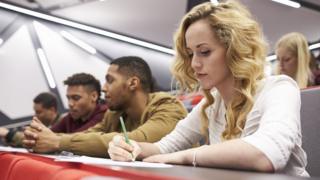Coronavirus: Students might have to stay in 'protective bubble'
By Sean Coughlan BBC News family and education correspondent Image copyright Getty Images
Image copyright Getty Images
Students might have to stay in a "protective bubble" of the same small group, when the UK's university campuses reopen in the autumn.
University leaders suggested students would live and study with the same group to minimise mixing.
They were setting out safety measures for a socially-distanced student life - including a virtual freshers' week.
A survey suggested 71% of students would prefer to start the term later, if they got more in-person teaching.
University campuses have been closed since the coronavirus lockdown, with teaching switching online, and their representative body, Universities UK has been setting out how they might bring students back for the autumn term.
How might campuses stay safe?
To prevent the risk of infection, the Universities UK briefing suggested students could be kept in small groups, sharing accommodation with people taking the same course, using the "protective bubble" approach used in primary schools in England.
Liz Barnes, vice-chancellor of Staffordshire University, said she had been discussing the idea of protective bubbles with other universities - with her university expecting to have eight people per bubble.
By housing students in groups taking the same subjects, with timetables that bring them on campus at the same time, it would minimise contact with other students.
"The more that we can keep them into a small group of regular interaction the better in current circumstances," said Prof Barnes.
Students could see others outside, but there would be controls on who could go inside accommodation.
This would also assume that university accommodation would have a big reduction in capacity, so that social distancing could be possible and facilities such as kitchens and bathrooms could be safely shared.
If lectures are delivered online, there would also be fewer people on campus.
What about the social life starting university?
The first week of university life - or freshers' week - is where students get a chance to socialise together. But University of Nottingham vice-chancellor, Shearer West, said it might not be "all singing, all dancing" this year.
This could be the case literally as well as metaphorically, if welcome events are online or restricted to small numbers.
"We're certainly planning to have people join things and get involved in societies, but we may just have to run freshers' fair in a different kind of way," said Prof West.
These could be "virtual events," said Universities UK president Julia Buckingham. But in a way that "we can guarantee students have social interaction with one another".
Is it going to be online or in-person?
Most likely a bit of both. The term being used is "blended", where students get a mix of online lectures and then in-person teaching for smaller groups. But individual students will want to know the balance for their chosen subject - how much will they be studying on campus and how much by distance learning?
Prof Buckingham, vice-chancellor of Brunel University, said she wanted to "dispel the image" that learning online was not the same quality.
And even if courses are entirely online, Universities Minister Michelle Donelan has said universities in England can charge full tuition fees.
How about starting term later?
According to a survey from the University and College Union, 71% of students would prefer to push back the start of term, if it meant they had more in-person and less online teaching.
The survey of 516 people applying to university this year also found 23% were worried that their preferred university could go bust because of the coronavirus outbreak.
Prof Buckingham suggested there would be flexibility for overseas students to start in January, if they were unable to travel for the autumn.
Some students might want to defer a year entirely to get a better experience. But with the prospect of no travel, few jobs and a socially-distanced social life, it's also been described as being the world's worst gap year.
What should students know before they decide about offers?
"Students need clarity as to what they can expect from the next academic year in order for them to make informed choices," says the National Union of Students.
The deadline for making a firm choice of university is 18 June - and the higher education watchdog, the Office for Students, says applicants have to be told with "absolute clarity" how they will be taught. And if a university subsequently changes what it offers then students should be released from their choices.
While the guidance from Universities UK sets out ideas and broad principles, students will want to know about their individual options. Will accommodation be available? How many hours of in-person teaching will there be? What campus facilities will be open? Will freshers' week be a laptop in their bedroom?
- A SIMPLE GUIDE: What are the symptoms?
- RISK AT WORK: How exposed is your job?
- HOW A VIRUS SPREADS: An explanation
- RECOVERY: How long does it take to get better?
Features
Elsewhere on the BBC
John Rebus: The Lockdown Blues
An exclusive new Rebus short from Ian Rankin
Full article John Rebus: The Lockdown BluesDaily news briefing direct to your inbox
Sign up for our newsletter
Full article Daily news briefing direct to your inboxfrom Via PakapNews